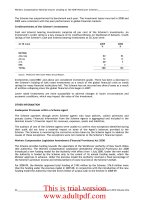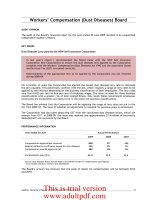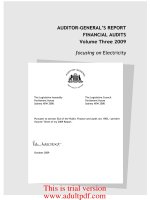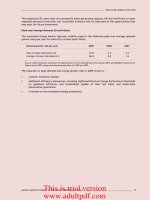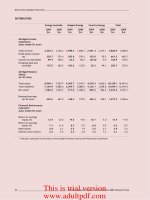New South Wales Auditor-General’s Report Financial Audit Volume Nine 2011 Focusing on Education and Communities_part1 doc
Bạn đang xem bản rút gọn của tài liệu. Xem và tải ngay bản đầy đủ của tài liệu tại đây (471.76 KB, 11 trang )
New South Wales Auditor-General’s Report
Financial Audit
Volume Nine 2011
Focusing on Education and Communities
This is trial version
www.adultpdf.com
The role of the Auditor-General
The roles and responsibilities of the Auditor-
&DMDQ@Kū@MCūGDMBDūSGDū TCHSū.EkBDū@QDūRDSū
out in the Public Finance and Audit Act 1983.
Our major responsibility is to conduct
kM@MBH@KūNQū?@SSDRSū@TCHSRūNEū2S@SDūOTAKHBū
RDBSNQū@FDMBHDRūkM@MBH@KūRS@SDLDMSRū
6Dū@KRNū@TCHSūSGDū3NS@Kū2S@SDū2DBSNQū BBNTMSRū
@ūBNMRNKHC@SHNMūNEū@KKū@FDMBHDRū@BBNTMSR
Financial audits are designed to add credibility
SNūkM@MBH@KūRS@SDLDMSRūDMG@MBHMFūSGDHQūU@KTDū
to end-users. Also, the existence of such
@TCHSRūOQNUHCDRū@ūBNMRS@MSūRSHLTKTRūSNū@FDMBHDRū
SNūDMRTQDūRNTMCūkM@MBH@KūL@M@FDLDMS
%NKKNVHMFū@ūkM@MBH@Kū@TCHSūSGDū.EkBDūHRRTDRū
@ūU@QHDSXūNEūQDONQSRūSNū@FDMBHDRū@MCūQDONQSRū
periodically to parliament. In combination
SGDRDūQDONQSRūFHUDūNOHMHNMRūNMūSGDūSQTSGū
@MCūE@HQMDRRūNEūkM@MBH@KūRS@SDLDMSRū
and comment on agency compliance with
BDQS@HMūK@VRūQDFTK@SHNMRū@MCū&NUDQMLDMSū
CHQDBSHUDRū3GDXūL@XūBNLLDMSūNMūkM@MBH@Kū
prudence, probity and waste, and recommend
NODQ@SHNM@KūHLOQNUDLDMSR
We also conduct performance audits. These
examine whether an agency is carrying out its
@BSHUHSHDRūDEEDBSHUDKXū@MCūCNHMFūRNūDBNMNLHB@KKXū
@MCūDEkBHDMSKXū@MCūHMūBNLOKH@MBDūVHSGūQDKDU@MSū
K@VRū TCHSRūL@XūBNUDQū@KKūNQūO@QSRūNEū@Mū
@FDMBXRūNODQ@SHNMRūNQūBNMRHCDQūO@QSHBTK@Qū
issues across a number of agencies.
Performance audits are reported separately,
with all other audits included in one of the
QDFTK@QūUNKTLDRūNEūSGDū TCHSNQ&DMDQ@KRū
Reports to Parliament – Financial Audits.
audit.nsw.gov.au
GPO Box 12
Sydney NSW 2001
The Legislative Assembly
Parliament House
Sydney NSW 2000
Pursuant to the Public Finance and Audit Act 1983,
I present Volume Nine of my 2011 report.
Peter Achterstraat
Auditor-General
7 December 2011
¡"NOXQHFGSQDRDQUDCAXSGD TCHS.EjBDNE-DV2NTSG
Wales. All rights reserved. No part of this publication may
ADQDOQNCTBDCVHSGNTSOQHNQBNMRDMSNESGD TCHS.EjBDNE
New South Wales.
3GD TCHS.EjBDCNDRMNS@BBDOSQDRONMRHAHKHSXENQKNRRNQ
damage suffered by any person acting on or refraining from
action as a result of any of this material.
The Legislative Council
Parliament House
Sydney NSW 2000
This is trial version
www.adultpdf.com
1
NSW Auditor-
General's Report
Volume Nine 2011
CONTENTS
Significant Items 2
Recommendations 5
Section One - Overview
Cultural Overview 8
Section Two - Agencies with Individual Comment
Minister for Aboriginal Affairs 14
New South Wales Aboriginal Land Council 14
Minister for Arts 23
Art Gallery of New South Wales Trust 23
Australian Museum Trust 26
Library Council of New South Wales 30
Sydney Opera House Trust 34
Trustees of the Museum of Applied Arts and Sciences 38
Minister for Education 43
Department of Education and Communities 43
New South Wales Technical and Further Education Commission 61
Minister for Family and Community Services 67
Department of Family and Community Services 67
Home Care Service of New South Wales 80
NSW Businesslink Pty Ltd 84
Minister for Heritage 87
Historic Houses Trust of New South Wales 87
Minister for Planning and Infrastructure 91
Sydney Olympic Park Authority 91
Minister for Primary Industries 94
Wentworth Park Sporting Complex Trust 94
Minister for Sport and Recreation 95
Sydney Cricket and Sports Ground Trust 95
Appendix 1 98
Index 99
Contents
This is trial version
www.adultpdf.com
2
NSW Auditor
-
General's Report
Volume Nine 2011
SIGNIFICANT
ITEMS
This summary shows those matters I identified during my audits that I believe are the most
significant issues agencies need to address.
Page
New South Wales Aboriginal Land Council
Rural properties to be transferred to Local Aboriginal Land Councils provided there is a
suitable business case 14
Discussion has commenced on the sustainability of the Land Council network 16
More than 26,000 land claims are still awaiting determination 16
The NSW Aboriginal Land Council’s investment portfolio received a return
of 8.26 per cent in 2010–11 (12.07 per cent in 2009–10) 18
Art Gallery of New South Wales Trust
There were over 305,000 visitors to the ‘First Emperor – China’s Entombed Warriors’
exhibition 23
Australian Museum Trust
The Museum remains uncertain as to the benefit of valuing its collection 26
At its current pace it will take the Museum between 77 and 99 years to record its current
collections in an electronic database 27
Library Council of New South Wales
The Library has now recorded about 80 per cent of its collection in its electronic
catalogue 30
Sydney Opera House Trust
The Sydney Opera House needs $1.1 billion to upgrade its facilities to remain viable
and to address access and safety concerns 34
Trustees of the Museum of Applied Arts and Sciences
Visitors to the Powerhouse Museum fell by 19.3 per cent in the past two years 38
The decrease in the number of exhibitions held by the Powerhouse Museum led to
reduced admissions 39
In 2010–11, the Powerhouse Museum’s collection acquisition program slowed
significantly 39
Department of Education and Communities
The Department coordinates the delivery of education and training for 753,596
primary and secondary students in New South Wales 43
The former Department of Education and Training was renamed the Department of
Education and Communities 43
The Department’s computer system replacement project has been deferred to ensure
it will meet future business requirements 44
The first phase of the Department’s computer system replacement project failed to
provide all expected benefits 44
At 30 June 2011, the Department had spent $176 million of the total project cost,
estimated at $386 million 45
Significant Items
This is trial version
www.adultpdf.com
3
NSW Auditor-
General's Report
Volume Nine 2011
SIGNIFICANT ITEMS
New South Wales Government Schools received $3.5 billion in Australian Government
Building the Education Revolution funding 45
Total estimated cost of the BER program expected to be within the original budget 45
Up to 31 October 2011, 2,353 projects have been completed at 1,775 schools under
the BER 46
The National School Pride program was completed within the approved budget 46
The Science and Language Centre program was completed within the approved budget 46
New South Wales students continue to perform consistently better than the national
average 47
New South Wales’ Year 12 retention rates are 4.7 per cent below the national average 48
The achievement gap between non-Aboriginal and Aboriginal students remains
significant 49
Participation in sport and recreation across New South Wales is consistently below the
national average 52
The Department has spent $137 million on the Connected Classrooms Program 52
The Department has installed Interactive Classrooms in 2,204 schools 53
192,000 laptops have been issued to students 53
Approximately 1,815 (less than one per cent) of laptops provided under the program
have been stolen or lost 53
The average cost of providing schooling in 2011 was $11,610 per student 53
The Department provided $828 million to non-government schools during 2011 54
In 2011, the New South Wales Government provided an average of $2,177 per
non-government school student 54
Forty four per cent of New South Wales teachers are over 50 years of age 56
New South Wales Technical and Further Education Commission
TAFE NSW is Australia’s largest vocational education and training provider and is
among the largest in the world 61
The average cost per enrolment decreased 8.7 per cent since 2007 61
There has been a 26.8 per cent increase in the number of enrolments in higher level
qualifications since 2006 62
There has been a 51.4 per cent increase in Aboriginal student enrolments from 2006 62
67 per cent of permanent TAFE NSW teachers are over 50 years of age 63
Department of Family and Community Services
Ongoing out of home care service delivery is at significant risk if Community Services
cannot maintain its accreditation 69
The Out–of-Home Care caseworker to clients’ ratio remains significantly more than
desired benchmark 69
This is trial version
www.adultpdf.com
4
NSW Auditor
-
General's Report
Volume Nine 2011
SIGNIFICANT
ITEMS
More Out-of-Home Care cases need to transfer to non-government organisations to
achieve quality casework and to meet statutory requirements 69
The average waiting time on the children and young persons’ Helpline increased by
almost one minute from 2:58 to 3:49 minutes in 2010–11 70
Indigenous children continue to be over-represented in the child protection system 72
People accessing disability and home and community care services increased by
nine per cent to 323,000 in 2011 73
Wentworth Park Sporting Complex Trust
The Trust has licensed land to the National Rugby League for construction of Rugby
League Central 95
This is trial version
www.adultpdf.com
5
NSW Auditor-
General's Report
Volume Nine 2011
RECOMMENDATIONS
This summary shows my more significant recommendations to agencies to address issues I
identified during my audits.
Page
Cultural Overview
Treasury should consider issuing further guidance to arts and cultural bodies on collection
valuation methodologies due to the significance of these assets to the State’s asset base. 8
New South Wales Aboriginal Land Council
NSWALC should ensure that Local Aboriginal Land Councils have the capability to
operate rural properties viably before the properties are transferred to councils. 14
The Council and the Minister for Aboriginal Affairs should implement agreed actions
arising from the review on sustainability of the NSW Aboriginal Land Rights Network. 16
Australian Museum Trust
The Museum should, in collaboration with other similar agencies, and in consultation with
NSW Treasury and the Audit Office, review the application of recollection cost in the
valuation of collections. 26
I again recommend that the Museum complete its program of recording its collections
on an electronic database as soon as possible. 27
Library Council of New South Wales
I again recommend the Library review the effectiveness of its policies in managing its
ageing workforce. 32
Department of Family and Community Services
I recommend the Department addresses the Ombudsman’s recommendations. 67
Home Care Service of New South Wales
Last year, I recommended Home Care develop and implement effective policies to
address and manage its ageing workforce. 81
NSW Businesslink Pty Ltd
Last year, I recommended management address, as a priority, the verification of
financial delegations. 84
In response, the Company advises it has implemented a checking process, which it has
incorporated into its annual training program to ensure all staff are aware of their
responsibilities. 84
Last year, I recommended the Company periodically review the roles and
responsibilities of all contract employees to ensure: reliance on contractors is not
excessive; use of contract employees instead of permanent employees is appropriate;
contractors do not become de facto employees by virtue of being with the Company
for an extended period of time; use of contract employees continues to represent
value for money; and it does not contravene established policies, tax legislation and
industrial relation matters relating to employment arrangements. 84
Last year, I reported the Company did not know the extent of flex time being accrued
and forfeited by staff, as it did not monitor, at the Company level, the effectiveness of
local management of flex time. I recommended the Company develop mechanisms to
centrally review flex time records to ensure excessive flex time was not being accrued
and forfeited by staff. 84
I again recommend the Trust implement procedures to reduce excess leave balances. 88
Recommendations
This is trial version
www.adultpdf.com
6
NSW Auditor
-
General's Report
Volume Nine 2011
RECOMMENDATIONS
Wentworth Park Sporting Complex Trust
I have previously recommended that the Trust endeavours to reach agreement with
Greyhound Racing NSW regarding the treatment of monies provided in 1985–87 by the
former Racecourse Development Fund. The matter remains unresolved. 94
This is trial version
www.adultpdf.com
Section One
Overview
Cultural Overview
This is trial version
www.adultpdf.com
8
NSW Auditor
-
General's Report
Volume Nine 2011
CULTURAL OVERVIEW
The following statutory bodies are included in this cultural overview:
x Sydney Opera House Trust
x Library Council of New South Wales
x Historic Houses Trust of New South Wales
x Art Gallery of New South Wales Trust
x Australian Museum Trust
x Trustees of the Museum of Applied Arts and Sciences (Powerhouse Museum).
The audits of the above entities’ financial statements for the year ended 30 June 2011
resulted in unmodified audit opinions within the Independent Auditor’s Reports.
Separate commentary on the above entities appears elsewhere in this volume.
Key Issues
Valuation of Collections
Recommendation
Treasury should consider issuing further guidance to arts and cultural bodies on collection
valuation methodologies due to the significance of these assets to the State’s asset base.
Collections held by these cultural institutions comprise artworks, maps, manuscripts, rare
books, biological assets, scientific specimens, scientific instruments, jewellery, technology
items and photographs. The value of the collections at 30 June 2011 was approximately
$4.3 billion, which represents a significant asset on the State’s balance sheet.
Treasury Policy
Australian accounting standards require assets to be revalued with sufficient regularity to
ensure their carrying amounts do not differ materially from fair value at the end of each
reporting period. Treasury requires cultural institutions to revalue their collections at least
every five years, or with sufficient regularity to ensure that their values approximate fair value.
Valuing cultural and heritage assets can be difficult. Artworks, furniture, jewellery, book
collections and coin collections can usually be valued based on market price by expert
valuers. Other collections have no active markets and valuation techniques are difficult to
establish.
To help agencies, Treasury issued ‘TPP 07-1 Accounting Policy: Valuation of Physical
Non-Current Assets at Fair Value’. This policy discusses/acknowledges the following issues:
x instances where heritage/cultural assets are not capable of reliable measurement due to
their uniqueness
x for specimens, the only available indicator of fair value may be reproduction cost (i.e. the
cost of mounting an expedition or field trip to collect similar replacement specimens,
together with the costs associated with their documentation and preparation)
x alterations to habitat and extinction of species make it impossible to replace many
specimens
x valuation of collections may require complex sampling techniques by professional
statisticians.
Cultural Overview
This is trial version
www.adultpdf.com
9
NSW Auditor-
General's Report
Volume Nine 2011
CULTURAL OVERVIEW
The following table shows the value of collections at major cultural institutions and the period
during which the last formal revaluation was performed. It also shows whether indexation was
applied between revaluations to reflect the effects of CPI and other market movements on
asset values.
Cultural Institution
Value of collection
($'000s)
Financial period of last
revaluation
Indexation applied
between revaluation
years (Yes/No)
Powerhouse Museum
397,683
2009
–10 No
Historic Houses Trust
37,557
Rolling basis 2006-07
to 2010
–11
No
State Library
2,139,351
2009–10
No
Art Gallery Trust
840,894
2010–11 library
collection
2006
-
07 collection
excluding library
No
No
Australian Museum
860,114
2007–08
Yes
(CPI
adjustment
in 2010–11)
Total value
4,275,599
The table above excludes the value of collection assets of the Sydney Opera House Trust, which at 30 June 2011
was $5.2 million.
Collection values may not reflect fair value if:
x revaluations are not conducted with sufficient regularity
x values are not adjusted for market movements between revaluations.
The following issues have also been identified in relation to collection valuations:
x for some years, cultural institutions have relied primarily on one expert to assist with
collection valuations as there limited valuation experts in the field
x valuations are based on statistical sampling rather than a full collection valuation
x some cultural institutions do not see the benefit of attributing values to certain collection
assets, especially biological specimens
x because the costs of performing full collection valuations are significant and unfunded, the
scope of work and decisions about the need for independent expert valuers are often
adversely impacted
x revaluations require significant management and staff time, especially from curators,
which adversely impacts their ability to fulfil their normal functions
I have commented later in this report on the difficulties encountered in valuating collection
assets at the Australian Museum.
Treasury guidelines governing the valuation of collections have not been updated for several
years. In my view, it would be beneficial to review the guidelines taking into account the
experiences to date and cultural institutions’ concerns.
Areas where Treasury guidelines could provide additional guidance include:
x the basis on which collection costs should be determined and guidance on the treatment
of costs associated with collecting assets on field trips or expeditions
x recognition of developments with digital recording as most cultural agencies have
significant portions of their collection assets available in digital format and are considering
whether these are assets
x guidance on indexing between full revaluations.
This is trial version
www.adultpdf.com



